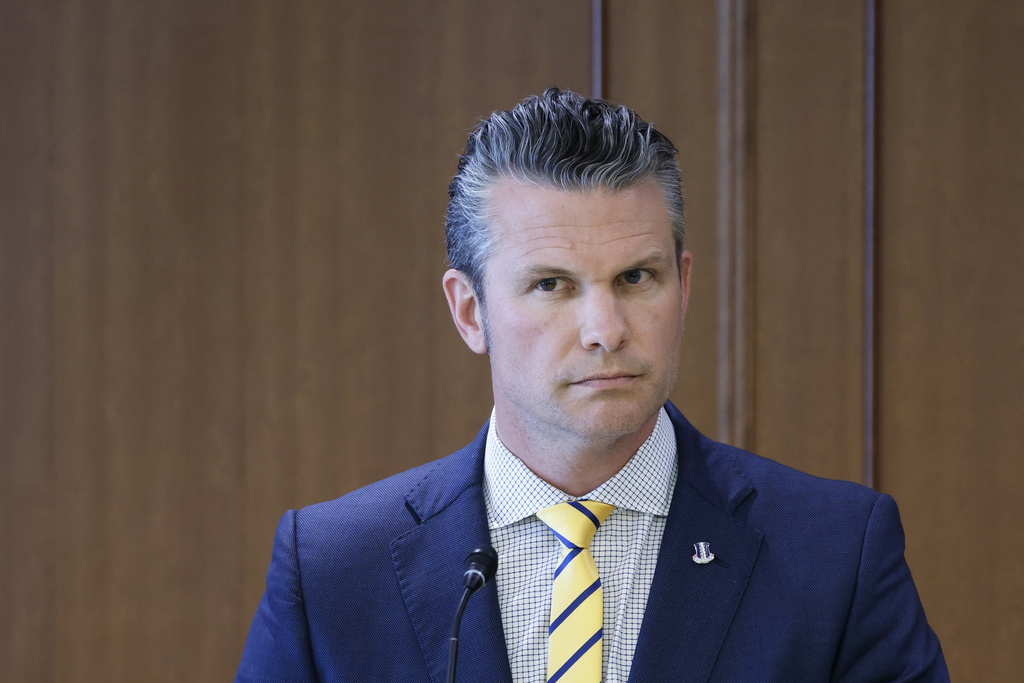
AP
U.S. Secretary of Defense Pete Hegseth attends a joint news conference with Japan’s Defense Minister Gen Nakatani at the Ministry of Defense in Tokyo Sunday, March 30, 2025. An NIU professor said military leaks on the messaging app signal could have had dangerous implications for the U.S. (Kiyoshi Ota_Pool Photo via AP)
DeKALB – An NIU professor said communication of U.S. planned military attacks on a non-secure messaging app can create dangerous implications for the U.S. Exact times and coordinates for the planned attack on the Houthis in Yemen for March 15 were posted on Signal by Secretary of Defense Pete Hegseth.
According to NIU political science associate professor Ches Thurber, the exact details of the attack on the Houthis being communicated on Signal was not a smart move by White House officials.
“If that information got into the wrong hands, it could have allowed the Houthis to better defend themselves, and that could have been in the form of shooting down American pilots who were on track to those targets,” Thurber said.
On March 11, Atlantic Editor-in-Chief Jefferey Goldberg was accidentally added to a group chat between senior national security officials under the Trump administration. The text messages included private military information about the planned attack on the Houthis in Yemen on March 15.
The chat was titled “Houthi PC small group,” the “PC” standing for principals committee. Some of the officials included, National Security Advisor Michael Waltz, and Vice President JD Vance. Goldberg was accidentally added to the chat by Waltz.
The app used to exchange military information was Signal, a free encrypted messaging app. Goldberg leaked the conversation between the White House officials in an article on March 24.
The communication methods used by the senior White House officials were out of the norm and unprofessional, according to some news outlets.
The group chat was originally created to discuss and exchange contacts of agencies that managed communications around the planned attack.
Thurber explains how the initial use for the group chat seemed typical of what the United States government uses the messaging app for.
“From my understanding, it is consistent with past precedent for how people in these positions used Signal in the past,” Thurber said.
The text messages in the chat then escalated to a conversation about whether or not this attack on the Houthis in Yemen was in the best interest of the U.S.
Senior White House officials spoke negatively of Europe in the messages. The chats showed derogatory messages about the continent of Europe, calling them pathetic.
“These comments they are making in public that are derogatory towards Europeans, toward traditional U.S. allies, are not simply cheap rhetoric for the purpose of whipping up a political audience,” Thurber said. “They are deeply felt and it is deeply ingrained in the way that these leaders think about international relations and U.S. foreign policy.”
Thurber explained how several laws could have been potentially violated in the chats between the officials.
One possible violation, according to national security experts, is the posting of classified information in a non-secure setting.
The Trump administration said the military attack plans were not classified. Trump has previously explained that when the president says it is not classified, it is not.
“It would be historically very abnormal for details of a planned military attack to not be classified,” Thurber said.
The text messages in the chat were programmed to be deleted after a week. This possibly violates the Presidential Act and the Federal Records Act which make it mandatory for government-related communications to be preserved.
For these violations to be pursued in court, the attorney general has to start an investigation and press charges. However, the Attorney General Pam Bondi has stated she is not going to.
Thurber said this incident can cause complications for U.S. relations with other countries.
“It raises a question of competence, of judgment, common sense about senior national security leaders in U.S. government right now,” he said. “I don’t think it takes someone with a career in national security experience to know that sharing detailed plans of attack on a group chat is just not common sense.”
The actions and rhetoric of Trump administration officials should not be brushed under the rug, but listened to and believed, Thurber said.
“When it comes to President Trump and the people that he surrounds himself with, you should take what they say seriously and literally. It’s not a joke,” he said. “It is deeply felt, and what they say they are going to do is a good prediction of at least what they are going to try to do in office.”
While looking at the bigger picture of the future of the U.S. and its allies, Thurber believes that we are in a time of dramatic change.
“This is a grand departure from the process through how foreign policy has been conducted by the United States,” Thurber said. “There’s no understating or trivializing that the U.S. in relations with its allies in Europe, with Canada, and Mexico have changed so dramatically overnight. I can’t think of a parallel in U.S. foreign policy of a pivot that dramatic that hasn’t been caused by some kind of attack on the homeland.”
